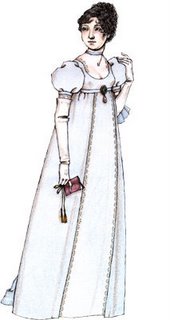 I've been reading about JA's juvenilia. I really want to read this one (as described on Wikipedia):
I've been reading about JA's juvenilia. I really want to read this one (as described on Wikipedia):Love and Freindship is a juvenile story by Jane Austen, dated 1790, when Austen was 14 years old. Written in epistolary form, like her later unpublished novella, Lady Susan, it is likely one of the tales she wrote for the amusement of her family. The installments, written as letters from the heroine Laura, to Marianne, the daughter of her friend, Isabel, "La Comtesse de Feullide," may have come about as nightly readings by the young Jane in the Austen home. Love and Freindship (the misspelling is one of many in the story) is clearly a parody of romantic novels Austen read as a child. This is clear even from the subtitle, "Deceived in Freindship and Betrayed in Love," which totally undercuts the title. In form, it resembles a fairy tale as much as anything else, featuring wild coincidences and turns of fortune, but Austen is determined to lampoon the conventions of romantic stories, right down to the utter failure of romantic fainting spells, which always turn out badly for the female characters. In this story we can see the development of Austen's sharp wit and distain for romantic sensibility, so characteristic of her later novels.


13 comments:
I also looked up what it said on "Lady Susan." I'm not the one who studied literature, so it's a unique thing for me to so easily find a writers early writings and junvenilia to see the growth. It would be really cool to read those works.
George, were you reading on Wikipedia? Did you see what Mark Twain said about JA? Erin was right. Whoever told Mark Twain he was funny should be shot.
Yeah, I also just did a search to try to find a little insight into his feelings on her. I came across another quote:
"It seems a great pity that they allowed her to die a natural death."
Good grief.
Wow, that Twain was a bigger moron than I thought. And Jane could've taught him a thing or two about funny.
I think Mark Twain is great. He's hilarious, despite what you may have heard from my wife.
But, Ben, do you agree with Twain's assessment of Austen?: "Jane Austen? Why I go so far as to say that any library is a good library that does not contain a volume by Jane Austen. Even if it contains no other book."
Of course I don't agree with that. I wonder whether Twain did. Perhaps he was just using her as material.
Yeah, see, I love Mark Twain. I think he's brilliant and hilarious. But he's also regarded as one of the great truth-tellers, one of the great tell-it-like-it-is, cut-to-the-chase, no pretentions, speak truth to power, wage war on hypocrisy kind of guys, but then he goes and makes an idiotic comment like that where you know he's not speaking the truth and you feel he knows he's not speaking the truth, and then not only is his comment not funny, but it makes him look like a dishonest jackass. Mark Twain is supposed to use humor to disarm social injustice, not perpetrate it!
Yes, exactly. That's what I've always liked about Twain, his cut-the-crap attitude. And I would've thought he would've enjoyed Jane's wit and social satire and disdain for hypocrisy.
I just found this article: "Did Mark Twain really hate Jane Austen?"
Good find, Erin! I love that essay, especially this: "Was Mark Twain a closet Janeite, a fake who read and appreciated far more of Jane Austen than he admitted?" Hehe.
And: Twain and Austen would have been hard pressed to decide who was the more irreverent of the two. Both took on clergymen, aristocrats, and "superiors" of all sorts, skewering them in just a few ironic words. Austen observed of some tedious neighbors, "I was as civil to them as their bad breath would allow" and pronounced her clergyman Mr. Collins "favoured" with stupidity. Twain noted of a clergyman, "He charged nothing for his preaching, and it was worth it too," and he quipped that doctors need but two things: ignorance and confidence.
Despite their pose as "mere" comic writers, both believed deeply in the power of their humor to reveal deeper truths about human behavior.
Both Twain and Austen had the "sense and the courage" to use humor to attack the "colossal humbug" they observed around them.
And it's brilliant how the author points out that other male American humorists have had real or professed disdain for Austen, among them Dave Barry and Andy Rooney, who were proud of their literary ignorance:
"Barry and Rooney seem to celebrate their philistinism—particularly in regard to women.
writers."
It's kind of like when Benjie made that "joke" that the only good books he read in a women's lit course were "by men." Haha ... Must be some kind of male syndrome.
That last is a joke, Benjie, because what you said was very Twainesque. And you laughed when I glared at you, just like Twain would have.
It's too bad I don't remember that conversation -- it was probably pretty funny.
Quit telling me you don't remember moments with me.
Post a Comment